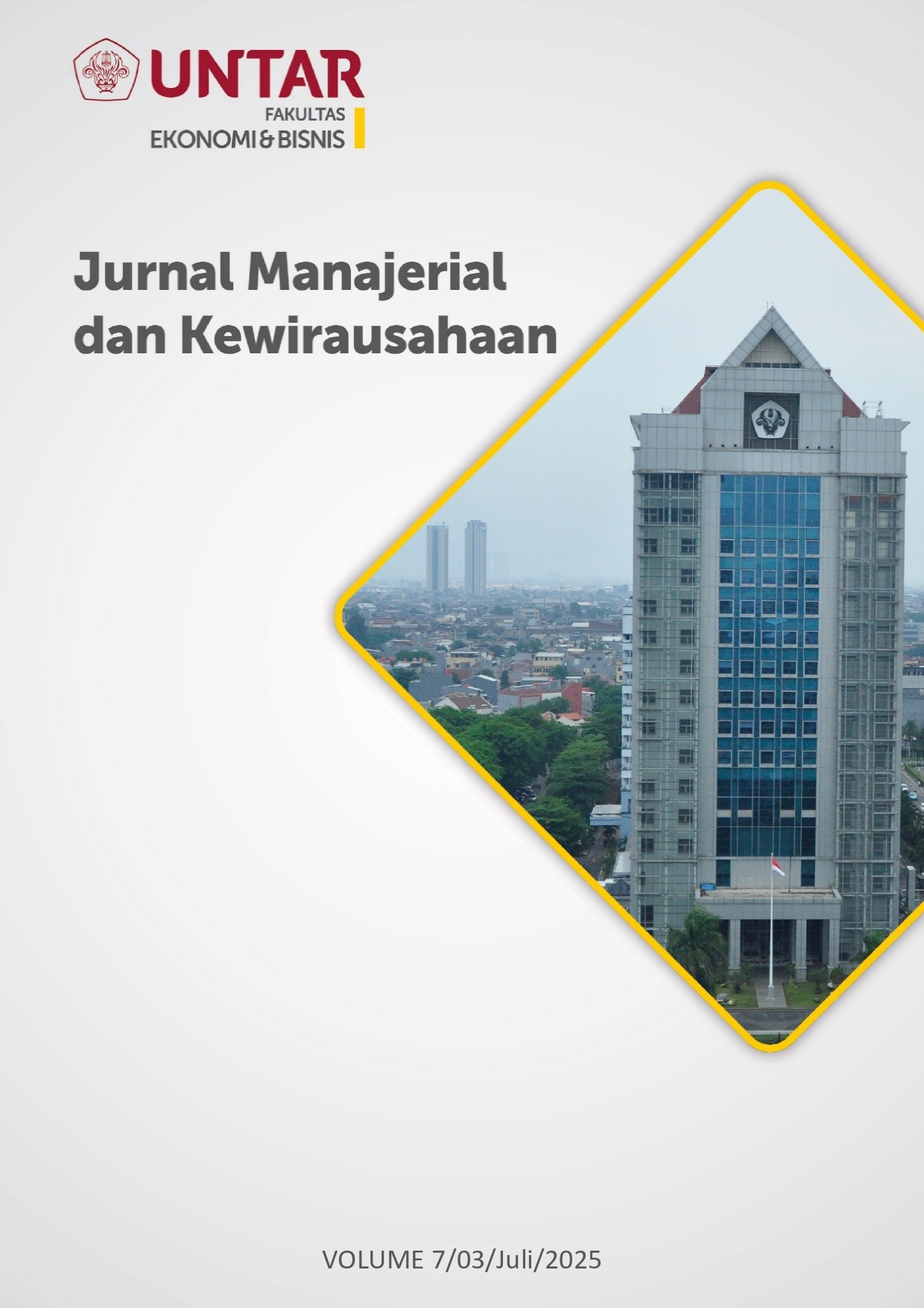Gen Z’s Financial Dilemma: Convenience Today, Consequences Tomorrow?
Main Article Content
Abstract
Penelitian ini bertujuan untuk mengetahui pengaruh pengetahuan keuangan, sikap keuangan, dan locus of control terhadap perilaku keuangan generasi Z yang menggunakan layanan PayLater. Pendekatan penelitian ini bersifat kuantitatif dengan metode survei, melibatkan 246 responden dari populasi generasi Z yang berdomisili di Jakarta. Data dikumpulkan melalui kuesioner dan dianalisis menggunakan model persamaan struktural (SEM) berbasis SmartPLS. Hasil penelitian menunjukkan bahwa pengetahuan keuangan berpengaruh positif dan signifikan terhadap perilaku keuangan. Sikap keuangan juga memiliki pengaruh positif dan signifikan terhadap perilaku keuangan. Selain itu, locus of control berperan sebagai mediator yang signifikan dalam hubungan antara pengetahuan keuangan dan perilaku keuangan. Temuan ini mengindikasikan bahwa generasi Z yang memiliki tingkat pengetahuan keuangan dan sikap yang lebih baik cenderung menunjukkan perilaku keuangan yang lebih positif, dengan locus of control yang turut memperkuat hubungan tersebut.
This study aims to examine the influence of financial knowledge, financial attitude, and locus of control on the financial behavior of Generation Z users of PayLater services. This research adopts a quantitative approach using a survey method, involving 246 respondents from the Generation Z population residing in Jakarta. Data were collected through questionnaires and analyzed using Structural Equation Modeling (SEM) with SmartPLS. The results indicate that financial knowledge has a positive and significant effect on financial behavior. Financial attitude also positively and significantly influences financial behavior. Furthermore, locus of control serves as a significant mediator in the relationship between financial knowledge and financial behavior. These findings suggest that Generation Z with higher levels of financial knowledge and better financial attitudes tend to exhibit more positive financial behaviors, with locus of control further strengthening this relationship.
Article Details
Section

This work is licensed under a Creative Commons Attribution-NonCommercial-ShareAlike 4.0 International License.
This work is licensed under a Jurnal Muara Ilmu Ekonomi dan Bisnis Creative Commons Attribution-ShareAlike 4.0 International License.,/p>
References
Aalders, R. (2023). Buy now, pay later: redefining indebted users as responsible consumers. Information, Communication & Society, 26(5), 941-956. https://doi.org/10.1080/1369118X.2022.2161830
Ajzen, I. (1991). The theory of planned behavior. Organizational Behavior and Human Decision Processes, 50(2),179-211. https://doi.org/10.1016/0749-5978(91)90020-T
Annisaa, M. N., Nuryasman, M. N., & Geraldina, I. (2023). Factors affecting the choice of payment method in modern retail shops. Jurnal Ekonomi, 28(3), 327-348. https://doi.org/10.24912/je.v28i3.1780
Baptista, S. M. J., & Dewi, A. S. (2021). The Influence of Financial Attitude, Financial Literacy, and Locus of Control on Financial Management Behavior. International Journal of Social Science and Business. 5(1): 93-98.
Gutter, M., & Copur, Z. (2011). Financial Behavior and Financial Well-Being of College Students: Evidence from A National Survey. J Fam Econ Iss. 32: 699-714.
Humaira, I., & Sagoro, E. M. (2018). Pengaruh Pengetahuan Keuangan, Sikap Keuangan, dan Kepribadian terhadap Perilaku Manajemen Keuangan pada Pelaku UMKM Sentra Kerajinan Batik Kabupaten Bantul. Nominal: Barometer Riset Akuntansi dan Manajemen, 7(1), 96-110.
Irrera, A. (2021), “As ‘buy now, pay later’ surges, a third of U.S. users fall behind on payments”. Diakses dari https://www.reuters.com/technology/buy-now-pay-later-surges-third-us-users-fall-behind-payments-2021-09-09/
Katadata. (2023). "8 Layanan PayLater Terpopuler di Indonesia, Shopee PayLater Juara."
Lusardi, A. (2019). Financial literacy and the need for financial education: evidence and implications. Swiss journal of economics and statistics, 155(1), 1-8.
Natswa, S. L. A. (2021, November). Buy-now-pay-later (bnpl): generation z’s dilemma on impulsive buying and overconsumption intention. In BISTIC Business Innovation Sustainability and Technology International Conference (BISTIC 2021) (pp. 130-137). Atlantis Press.
Osman, A. Z., Sabri, M. F., & Chiew, T. H. (2018). Determinants of financial literacy and financial behaviour among youth in Malaysia. International Journal of Social Economics, 45(1), 63-78.
Pradiningtyas, T. E., & Lukiastuti, F. (2019). Pengaruh Pengetahuan Keuangan dan Sikap Keuangan terhadap Locus of Control dan Perilaku Pengelolaan Keuangan Mahasiswa Ekonomi. Jurnal Minds: Manajemen Ide Dan Inspirasi, 6(1), 96-112.
Pusparani, A., & Krisnawati, A. (2019). Analisis Pengaruh Financial Literacy dan Financial Attitude terhadap Financial Behavior pada Siswa Sekolah Menengah Pertama di Kota Bandung. Jurnal Mitra Manajemen (JMM Online), 3(1), 72–83.
Rahmawati, N. W., & Haryono, N. A. (2020). Analisis faktor yang memengaruhi financial management behavior dengan mediasi locus of control. Jurnal Ilmu Manajemen, 8(2), 549-563.
Rizkiawati, N. L., & Haryono, N. A. (2018). Pengaruh Demografi, Financial Knowledge, Financial Attitude, Locus of Control dan Financial Self-Efficacy terhadap Financial Management Behavior Masyarakat Surabaya. Jurnal Ilmu Manajemen (JIM), 6(3).
Rotter, J. B. (1966). "Generalized expectancies for internal versus external control of reinforcement." Psychological Monographs: General and Applied.
Schomburgk, L., & Hoffmann, A. (2023). How mindfulness reduces BNPL usage and how that relates to overall well-being. European Journal of Marketing, 57(2), 325-359.
Schulz, M. (2022), “42% of BNPL users have made a late payment”. Diakses dari www.lendingtree.com/personal/bnpl-survey

